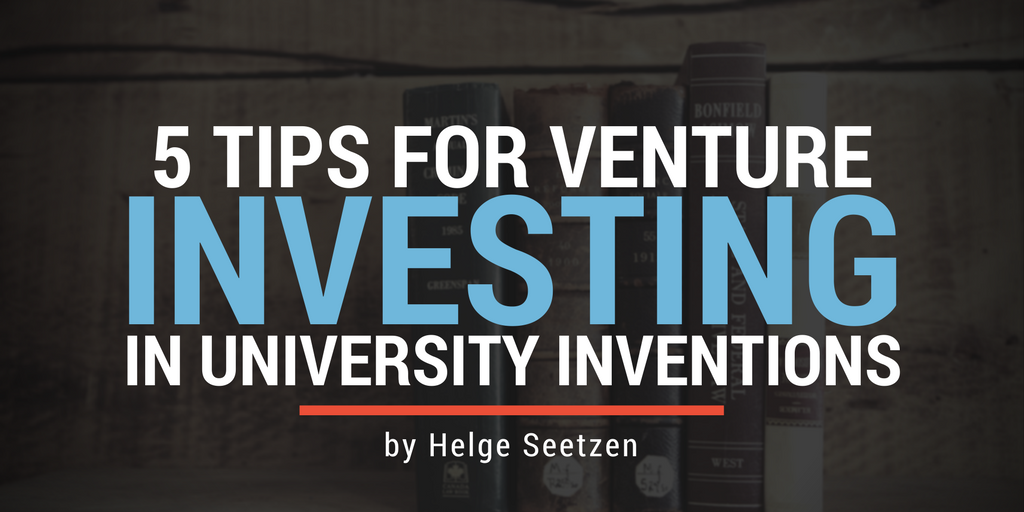Investing in university ventures is difficult but worthwhile. The following are a few things to consider when you are negotiating investment deals with universities. All of this comes from my own experience and might not reflect the engagement with your particular university.
1. Know who you are engaging
University Technology Transfer Officers (TTOs) are neither entrepreneurs nor lawyers (the two common contacts for a traditional venture investor). They are a curious mix between business developer without strong incentives and legal administrator without formal background. Your common TTO has a technical PhD (university value system at work) and very little off-campus work experience.
Add a high turn-over and a low frequency of equity deals per TTO, and you get significant knowledge variability. Some TTOs are exceptionally well versed operators, while others need an explanation of basic terminology (e.g. “vesting”). Of course both types usually share the same generic TTO title.
Try to physically meet your TTO counterpart early on to get a sense of their experience. Make sure that you carefully explain terminology of your world. Ask them to return the favour and carefully explain the university context to you. Universities have their own culture and vocabulary when it comes to commercialisation. The more you normalize your language, the better your chances of closing a deal.
2. Licensee vs. Investor
It is truly unfortunate that most university investment deals are considered a “license”. For a traditional license the TTO is usually approached by companies that have established an internal need for a certain technology and would like to procure it. The licensee wants something and the TTO has it.
The inverse is true in the venture world where it is the entrepreneur who wants the money and the investor who has it. Even in today’s frothy market, entrepreneurs pitch to VCs, write business plans, travel to partner meetings, etc. University inventors don’t pitch (or do any of the other things that you would normally expect as an Angel or venture investor). Instead, they often genuinely believe that they are doing you a favour by taking your money. Don’t get offended when this happens. It’s a consequence of their (sheltered) reality and not intended as a negotiation stance.
3. Charter vs. Folklore
Universities have a lot of fundamental charter constraints. These are unavoidable and as an investor you just need to learn to live with them. But universities also have a lot of folklore that at first glance appear like charter issues. A classic example would be the often-quoted Bayh-Dole Act in the US: “We cannot sell the technology [Charter: Bayh-Dole prohibits assignment] so we need an ongoing royalty [Folklore: Bayh-Dole makes no provision whatsoever about payment modality]”.
Understanding these differences can be critical for business decisions (e.g. the inability to collect a lump sum payout would scuttle most venture investment deals for technologies with long times to market whereas the inability to assign wouldn’t be a deal killer for the same investor). Beyond studying policy, your best bet is to ask the TTO to provide not just the “rules” but also the reasons behind them.
4. Risk is Anathema
University inventors aren’t just risk-averse. They don’t just assess risk and then decide against taking it – they often genuinely don’t understand the concept of risk. This usually pops up during the valuation process. Inventors, and to some degree TTOs, tend to over-value ideas. On the flip side, they tend to under-value human contributions. I have had TTOs question why we would allocate equity to (low or unpaid) employees of the venture at all.
De-coupling past from future is your best bet for crossing this chasm. The past is sunk cost. The value of the invention has nothing whatsoever to do with the (government) money spent to get there and everything to do with the commercial opportunity going forward. You should therefore make a distinction between those inventors who will make substantial operational contributions post-founding and those that won’t. The latter will be adequately provided for by the university portion of the deal. The former should be treated as founder. Simply ignore the fact that they will also receive some proceeds through the university channel. Mixing up these two types will give you nothing but grief.
5. Don’t Screw Them
It’s so easy. Universities are early (common) shareholders; they don’t have a voice in the company; their value contribution is mostly made already (IP injection); and they usually don’t fight back. It would be so easy to squeeze them just a bit more out of the cap table. Fight.That.Thought!
Every time that an investor or entrepreneur screws a university, it becomes part of the global university folklore. Universities and their Tech Transfer Office are like a hive mind. I recently had a TTO tell me straight-faced that “we always get diluted to nothing in equity deals” – at a university that has never actually done an equity deal. Hive mind.
Their concern is real and they get screwed often enough. But everybody who screws them a bit makes life massively harder for hundreds of upstanding investors and entrepreneurs. You are poisoning the well in the backyard. Don’t do it.



